Is This Wimbledon? No, It's Iowa.

America is full of sports wonders, but they aren't always easy to find. The October 2021 issue of Sports Illustrated spotlights Hidden Gems across the country, from an unlikely spawning ground of Olympic swimmers in Kentucky to a custom-built sandlot baseball field in Texas. As it turns out, there's nothing like feeling the magic of sports in places you'd least expect.
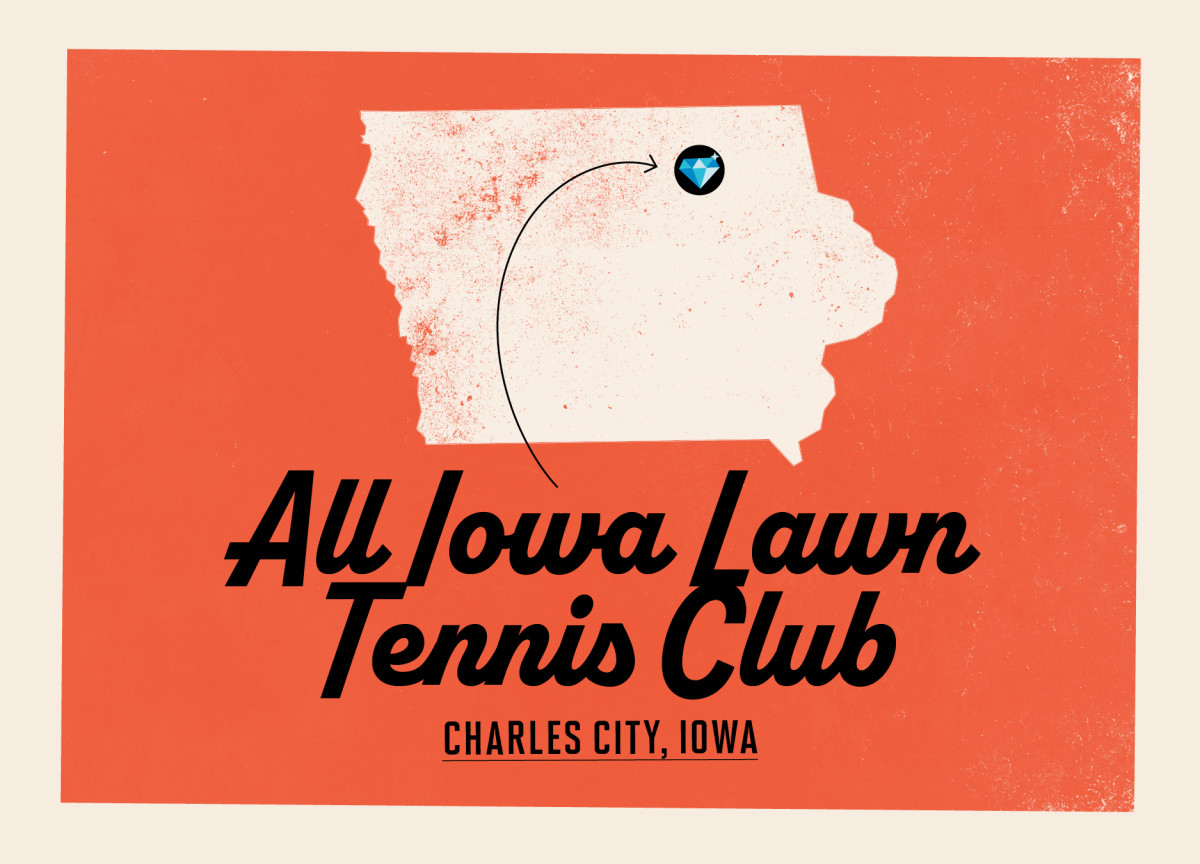
Mark Kuhn was dreaming about tennis. It was a summer day in 1962, and the 11-year-old was waiting patiently for Chico to take a drink on the cattle feedlot. Chico, his sister’s pinto pony, liked to take his time at the water trough, so Kuhn would let his mind wander someplace else, far beyond his family’s farm in rural Iowa.
He thought a lot about tennis in those days. Kuhn had fallen for the sport two summers earlier, when he and his grandfather had listened to a BBC broadcast of Wimbledon on a shortwave radio, the rhythmic pop of the ball and the charm of soft-spoken Queen’s English floating more than 4,000 miles from the All England Lawn Tennis Club to his grandpa’s living room. He started playing soon after. And surveying the feedlot on that day in 1962, an idea struck him: This would be a great place for a grass tennis court.
It was the adolescent fantasy of a boy prone to dreaming big. But however improbable it seemed, the seed had been planted. It would stay in his head for 40 years, remaining there as he took over the family farm, married and raised two sons.
These days, the Kuhn family farm isn’t much different from the way it looked in 1962. You’ll still see hundreds of acres of corn and soybean crops, and the shed that housed Chico’s stall. But you won’t see that feedlot. Instead you’ll find a perfectly maintained grass tennis court, a surreal salute to Wimbledon surrounded by quintessential heartland scenery. A 6' 4" mustachioed man greets visitors with a wide grin.
“Hello,” says Kuhn, 71. “Welcome to the All Iowa Lawn Tennis Club.”
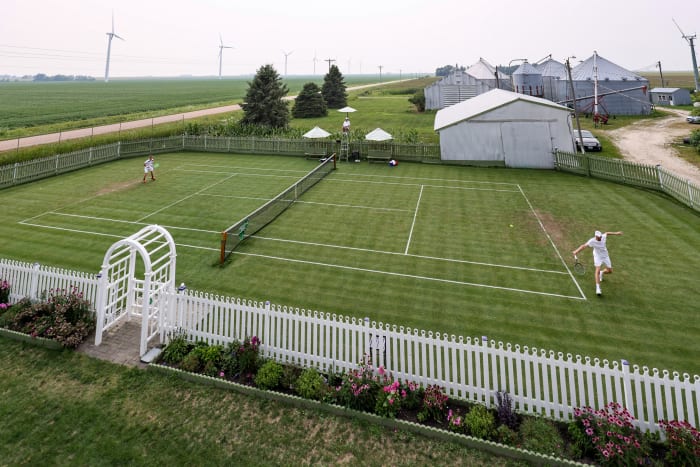
The All Iowa Lawn Tennis Club is a "whimsical replica" of Wimbledon, as the court's creator puts it.
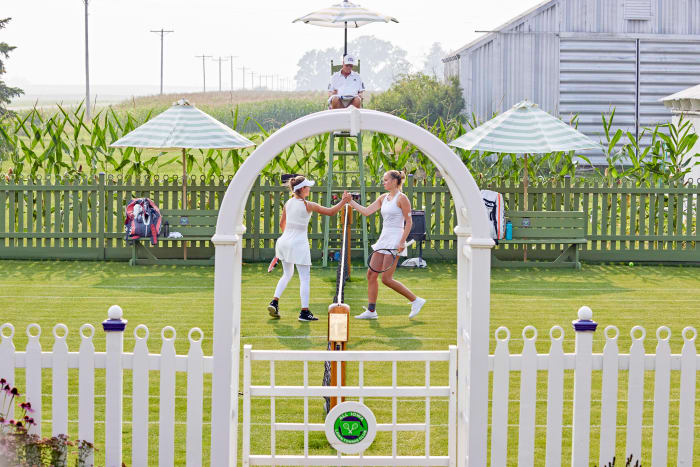
Grass tennis courts are rare in the United States, and farmer Mark Kuhn's creation is an even rarer non-private lawn.

At the Long Time, a sandlot baseball field near Austin, the score isn't as important as the vibe.

Hand-painted signs give the Long Time a nostalgic, rustic feel.

Kentucky's Lakeside Swim Club has produced a staggering number of Olympic swimmers, including a Tokyo 2020 medalist.

Lakeside is known for its competitive pedigree, but the converted rock quarry is just as famous for its gorgeous setting amid 40-foot cliffs.

Elston Gene Howard Field, named for the Yankees' first Black player, is built in the shadow of the team's new stadium—and aligns with the original House that Ruth Built.

There are three diamonds at the Bronx park for baseball and softball, one of which features a piece of the original Yankee Stadium facade.

Detroit City FC plays its home games at Hamtramck's Keyworth Stadium, which the club's supporters helped rebuild.

After going fully pro in 2020, third-division Detroit City FC has won multiple trophies, including a 2021 league title.

The diamond portrayed in the 1989 film "Field of Dreams" is the quintessential hidden gem, but the film site is now a popular tourist attraction—and in August, hosted a Major League Baseball game.

Thousands of fans watched the White Sox and Yankees compete in MLB's Field of Dreams game this summer.

There are few basketball courts like Rucker Park in New York City. In the 1960s and ’70s, future NBA legends like Earl Monroe and Julius Erving took on the city’s street elite in playground director Holcombe Rucker’s summer tournament.

Rucker Park had humble beginnings, but the blacktop is now famous across the hoops world.

Retired farmer Mark Kuhn, who started building his grass court in 2002, spends around 12 hours a week maintaining the All Iowa Lawn Tennis Club.

Kuhn was first drawn to tennis as a boy, when he heard a broadcast of Wimbledon over his grandfather's radio.

The Texas Playboys, a team of artists and creative types, plays their home games at the Long Time.

Hundreds of Texas Playboys season-ticket holders come not only to watch the Playboys face teams from around the region but also to catch whatever other performances might be in store from a club full of creatives—say, an acoustic set from a player’s new record during the seventh-inning stretch.

The Lakeside SeaHawks are the Louisville club's top-flight swim team.

There's nothing quite like Lakeside's converted rock quarry. “Either you’ve been there, or you want to go there," says Arizona State swim coach Bob Bowman, who mentored Michael Phelps to a record 23 Olympic gold medals

Kids in the Bronx are able to run in the footsteps of Babe Ruth, Lou Gehrig, Mickey Mantle and Derek Jeter at Elston Gene Howard Field, which is part of Macombs Dam Park.

A sign behind the backstop of one diamond at Elston Howard Field quotes Lou Gehrig's famous speech: "Today I consider myself the luckiest man on the face of the earth."

Detroit City FC's branded beer is Smoke Delay IPA, named for the—you guessed it–fan-induced smoke delays that often accompany home matches.

Detroit City FC's Northern Guard marches half a mile through Hamtramck to Keyworth Stadium on match days.

The White Sox beat the Yankees in this year's Field of Dreams game.

Over the years, Rucker Park has become world-famous. Bill Clinton and David Stern even stopped by in 2001 for the Entertainers Basketball Classic, which carries on the old Rucker tournament’s legacy.

Texas Playboys founder (and pitcher) Jack Sanders is also the Long Time's designer. He never stops tinkering with the ballpark's layout.

The Long Time is popular enough around Austin that the ballpark has sponsors and offers concessions.

Lakeside Swim Club has produced 11 Olympians over the years, including 2020 silver medalist Brooke Forde.

Thousands of tennis players have flocked to Kuhn's farm to play on the family's grass court, including University of Iowa associate tennis coach Daniel Leitner.

These days, the All Iowa Lawn Tennis Club is also a tribute to Kuhn's late son, Alex.

All that remains of New York’s Polo Grounds is a set of stairs that descends Coogan’s Bluff down to the housing complex that stands where the ballpark once did. Originally built in 1913, the John T. Brush stairway, named for the Giants’ owner who died in 1912, led down to a ticket booth.

The Detroit City Futbol League, a coed adult circuit, predates the club's senior team and includes volunteering incentives that can impact the standings.

Keyworth Stadium, the first Works Progress Administration project in Michigan, was opened in 1936 by President Franklin D. Roosevelt.
Let’s get this out of the way. The All Iowa Lawn Tennis Club is not a club. For one, there’s no clubhouse. There’s just a regular old house where Kuhn, who retired from farming in 2018, lives with his wife, Denise, and two Clumber spaniels, Murray and Milos—named for 2016 Wimbledon finalists Andy Murray and Milos Raonic. While the All England Club has just 375 full members, entry is even harder to gain at the All Iowa. Of course that’s because there aren’t any members. Anyone can play here—from Memorial Day to September—for free. And since the court opened in 2003, thousands of tennis devotees have come to this unlikely patch of Britannia to serve and volley on perhaps the finest grass tennis court in the U.S.
Kuhn’s farm is in northern Iowa on the outskirts of Charles City, whose population couldn’t fill even half of Wimbledon’s 14,979-seat Centre Court. From the main highway, you have to drive nearly four miles on a dusty gravel road that will have your car looking like it just played five sets at Roland Garros. The court is adjacent to the Kuhn home, surrounded by miles of crops and flanked by gray corn-drying bins and giant wind turbines, their rotor blades slowly spinning in the summer breeze. Here the royal box is a screened-in porch, where you’ll find Wimbledon memorabilia and even, if you’re lucky, Queen Denise herself.
There are a handful of sites with grass courts across the country, including the International Tennis Hall of Fame in Newport, R.I., and the West Side Tennis Club in Forest Hills, N.Y., once home to the U.S. Open. But most are private, and only the All Iowa, with its ubiquitous shades of purple and green, is designed to evoke the Grandest of Slams. Kuhn’s court is a perennial ryegrass, the blades of choice at the All England Club. He draws the lines with a white titanium-based compound, same as SW19, keeping them straight with a Wimbledon-approved method involving a string and stakes. It’s an hour of maintenance a day, minimum, and the weekly total runs closer to 12. “There’s the Wimbledon way—that’s the way they do it,” Kuhn says with admiration. “And it takes a lot of work.” He learned that firsthand in 2012 during an internship with the Wimbledon grounds staff, where he finally saw with his own eyes the court he had re-created a decade earlier.
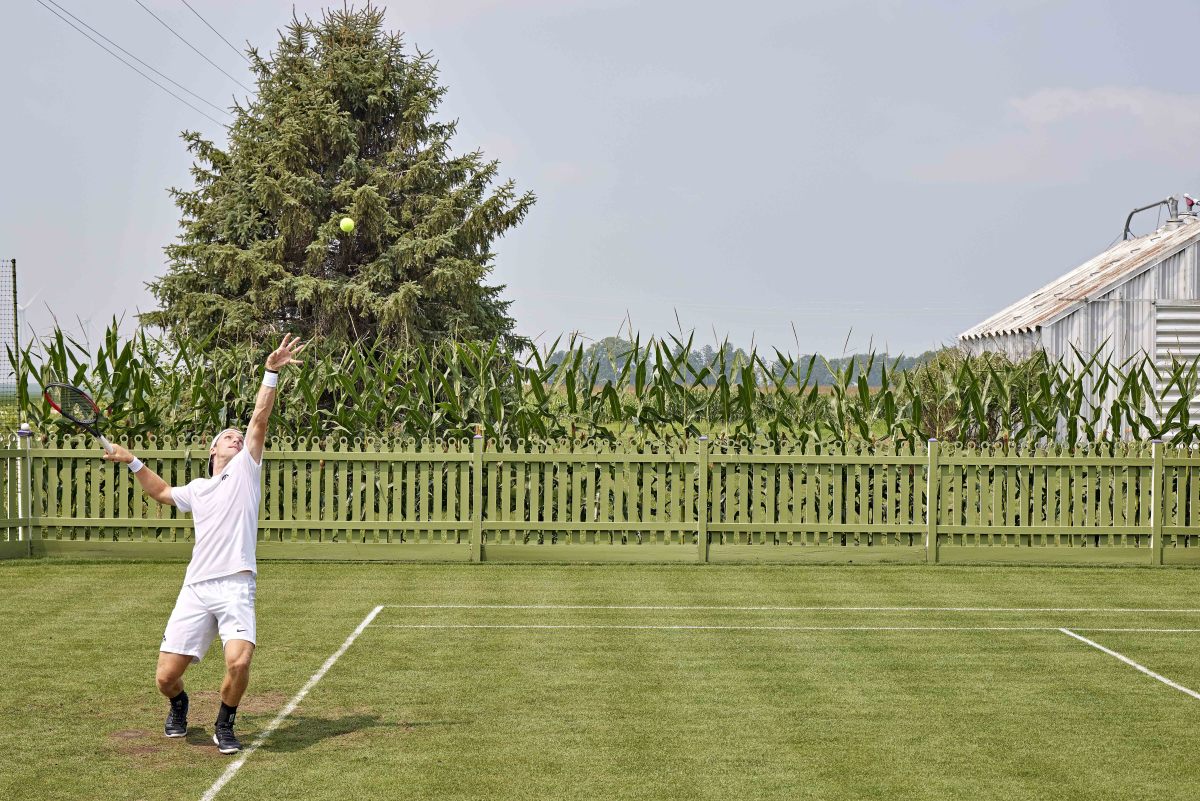
But the playing surface isn’t the only touch of All England at the All Iowa. A wrought iron gate bearing the gold letters AILTC, built to resemble its long-lost ferric cousins across the pond at the AELTC, stands guard out front. A Wimbledonesque picket fence, each panel hand-cut from cedar and painted white and green, frames the lawn, enveloped by a medley of coneflowers, phlox, geranium, sage, pink dianthus, purple angelface, salvia, daylily and common yarrow. A green umpire’s chair overlooks the lawn. It’s as quiet here as Centre Court before a Federer serve, save for the soothing symphony of rural Iowa: English sparrows, red-winged blackbirds and cardinals singing; insects murmuring in the fields; a crop duster lazily humming overhead; a pickup truck rumbling down the gravel road. And, more familiar to All England goers, the sweet pop of yellow felt on strings.
The death of a close friend—a farmer who lived nearby—in 2002 prompted Kuhn to act. “It was time to either do it or just quit thinking about it,” he says. Turf grass experts from Iowa State tried to talk him out of the idea because of the difficult upkeep. “Well, I’m a farmer,” Kuhn replied. “That’s what we do for a living—we grow things.” It took all his botanic savvy and a year and a half of manual labor, but in September ’03, Kuhn—with help from his sons, Mason and Alex, and a makeshift grounds crew of other family and friends—opened what he calls his “whimsical replica” of Wimbledon. Never did he expect it to become a destination. He just wanted to build it.
“They say love means nothing to a tennis player,” says Brian Parrott, a friend of Kuhn’s and the tennis coach at Charles City High. “But this was a work of love.”
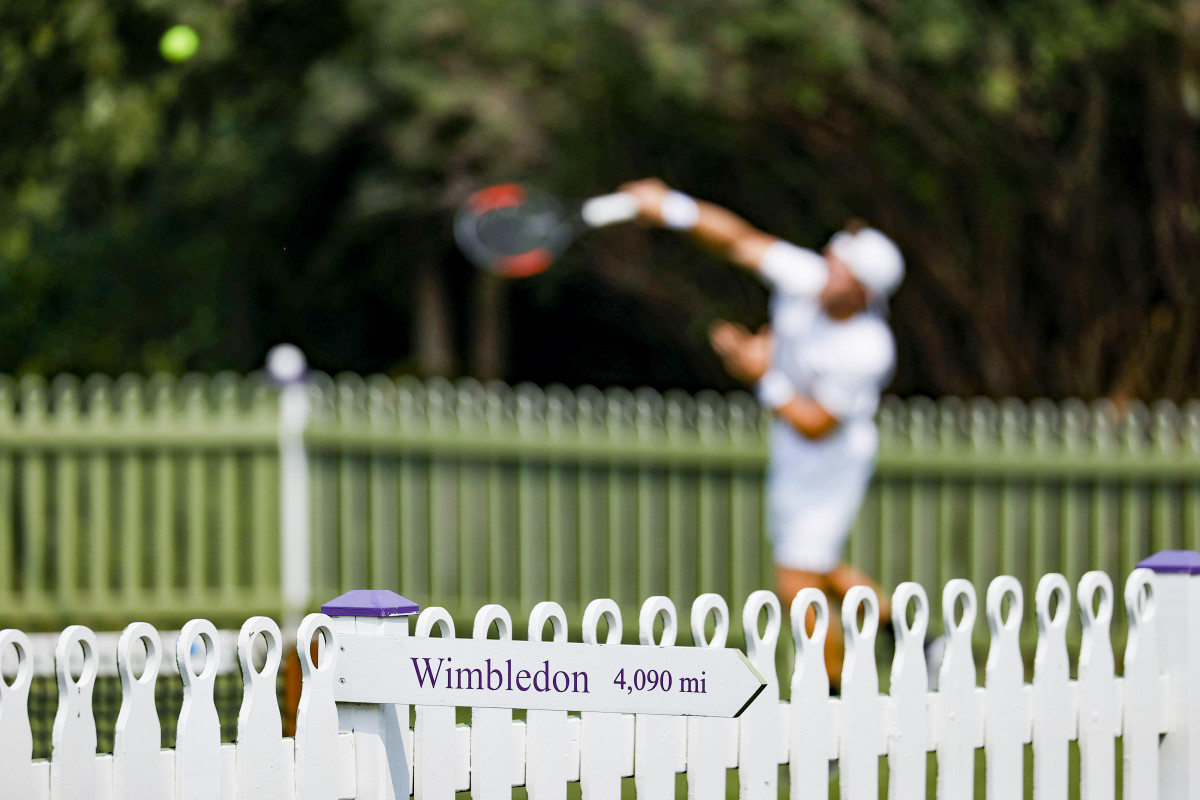
Kuhn’s creation naturally invites comparisons to Field of Dreams, given its location 100 miles northwest of the film site. While the ghosts of Althea Gibson and Arthur Ashe have yet to emerge from the cornfields to hit groundstrokes, the Court of Dreams has attracted all sorts of curious tennis enthusiasts, from almost every state and even abroad. Most have only dreamed of playing on grass, the sport’s original surface, and, as Kuhn puts it, “how the game was meant to be played.” One group from Texas visits every year. Vikings quarterback Kirk Cousins stopped by this summer to hit and pick Kuhn’s brain about building grass courts at his own home.
Kuhn still plays several times a week on his lawn, mostly with his grandson, despite a Parkinson’s diagnosis and ruptured quad tendons. (His commitment to tennis is unquestionable: During his tenure in the state legislature, where he served six terms, he’d bring his racket to Des Moines and practice volleying against a statehouse wall.) He speaks of the All England Club with religious reverence, his eyes twinkling as he recounts tales from across the pond, like meeting Stan Smith or unwittingly breaking the rules by cracking a serve on Centre Court. (“This is a week before Wimbledon started—some Iowa farmer is not supposed to be out here serving!”)

These days, though, the All Iowa is more than a paean to the All England Club. In 2016, days after Mark and Denise returned from another joyous trip to Wimbledon, where Kuhn served as a court attendant for the fortnight, their son Alex—34 years old, a beloved community leader and an avid tennis player—came over for a barbecue. The next day, they learned he had died by suicide.
“There’s guilt in that,” Kuhn whispers. “Here you’re up on the top of the world, and then you’re at the lowest point you’re ever going to experience.”
The Kuhns closed the court Alex helped build for the rest of the season, canceling around 75 reservations. But later that summer, Mark embarked on a cathartic renovation, stripping the lawn—previously bentgrass, often used on golf greens—and planting the perennial ryegrass Alex had always envisioned. In June 2017, the family unveiled the reimagined Alex J. Kuhn Court of Dreams. “We wanted to keep it going,” Mark says. “For me, in many ways, it’s the continuation of his ideals and his legacy.”
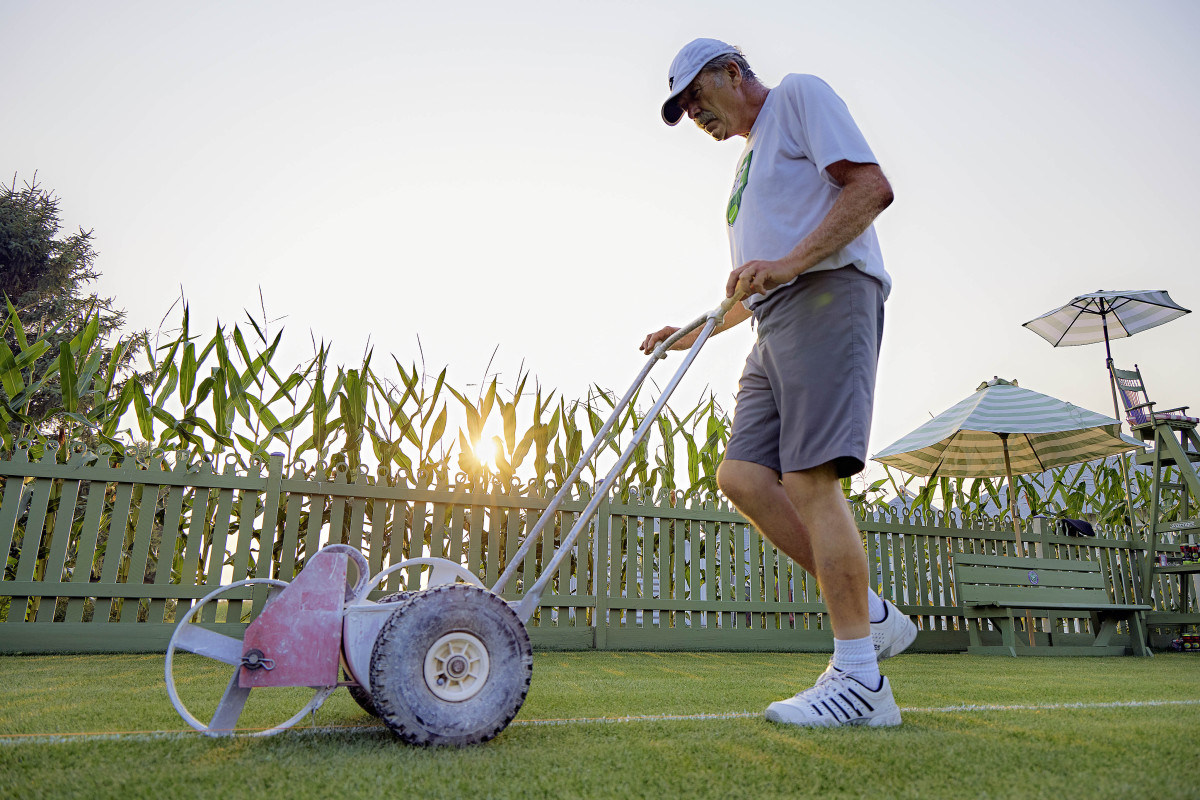
That legacy now includes an annual junior event, the Alex J. Kuhn Invitational—where this year Alex’s 15-year-old son, Rylan, more than held his own—and the All Iowa Lawn Tennis Club Foundation, a nonprofit supporting the club’s future and reading programs for children, one of Alex’s passions.
Through it all, his father has tenderly cared for every blade of grass. That’s the magic of this place—even more than its English charm crossed with Midwestern idyll, beyond the wonder of playing on the surface where tennis was meant to be played. The All Iowa Lawn Tennis Club is rooted in love. On this court, at least, that does not mean nothing.
• Welcome to the Lone Star State's Sandlot Revolution
• Inside Kentucky's Storied Lakeside Swim Club
• How Detroit City FC Fans Built Their Own Club
